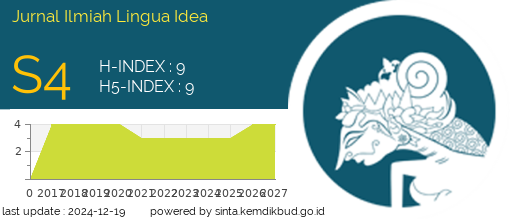A LACANIAN PSYCHOANALYSIS OF THE CHARACTER KARMAN IN AHMAD TOHARI’S KUBAH
Abstract
JacquesLacan’s poststructuralist theories of psychology have greatly affected modern understandings of the human psyche. This is evident in literary studies, where numerous thinkers – including Lacan himself – have applied these theories to better understand works of literature. One work which benefits from such an application is Ahmad Tohari’s Kubah, a 1982 novel on the ex-communist Karman’s seeming redemption after spending twelve years as a political prisoner. This paper will use a Lacanian psychoanalysis to show how Karman’s need to find wholeness, one which has been lost since before his birth, led to his various activities, including the joining of the Communist Party and his return to Islam. Although the novel ends on a hopeful note, it will be shown that Karman has not truly found the wholeness for which he has searched.
Authors who publish with Jurnal Ilmiah Lingua Idea agree to the following terms:
- Authors retain copyright and grant the journal right of first publication with the work simultaneously licensed under a Creative Commons Attribution License (CC BY-SA 4.0) that allows others to share the work with an acknowledgment of the work's authorship and initial publication in this journal.
- Authors are able to enter into separate, additional contractual arrangements for the non-exclusive distribution of the journal's published version of the work (e.g., post it to an institutional repository or publish it in a book), with an acknowledgment of its initial publication in this journal.
- Authors are permitted and encouraged to post their work online (e.g., in institutional repositories or on their website) prior to and during the submission process, as it can lead to productive exchanges, as well as earlier and greater citation of published work.





















.png)






